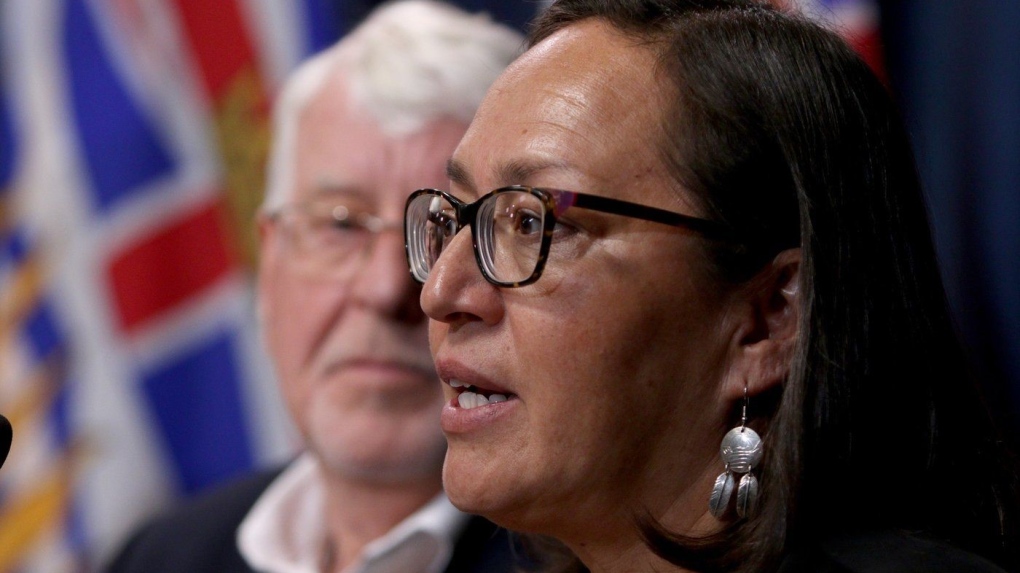First Nations women overrepresented among B.C. toxic drug deaths: doctor
 Dr. Nel Wieman with the First Nations Health Authority speaks about the illicit drug toxicity deaths in the province and about the effect on First Nation's communities during a press conference at B.C. Legislature in Victoria, B.C., on Monday, February 24, 2020. THE CANADIAN PRESS/Chad Hipolito
Dr. Nel Wieman with the First Nations Health Authority speaks about the illicit drug toxicity deaths in the province and about the effect on First Nation's communities during a press conference at B.C. Legislature in Victoria, B.C., on Monday, February 24, 2020. THE CANADIAN PRESS/Chad Hipolito
The top doctor at British Columbia's First Nations Health Authority says Indigenous people, especially women, are dying from toxic drugs at disproportionately high rates as the overdose crisis continues “unabated,” nearly seven years after the province first declared a public health emergency.
Dr. Nel Wieman, the acting chief medical officer, says illicit drugs are killing First Nations people at five times the rate of B.C.'s general population.
She says that figure rose to 8.8 per cent for First Nations women, specifically, compared with non-Indigenous women in the province in the first half of 2022.
That number contrasts with the overall toll for the province, which shows 79 per cent of those who died from toxic drugs last year were male.
Wieman's remarks came as B.C.'s chief coroner released data Tuesday showing suspected drug toxicity claimed 2,272 people last year, and as B.C.'s exemption to federal drug laws took effect, allowing adults to carry small amounts of certain illicit substances without fear of being arrested or having their drugs confiscated by police.
She says the underlying reasons for the increased impact of the toxic drug crisis on First Nations people in B.C. are “complex and varied,” including intergenerational trauma stemming from Canada's residential school system and the apprehension of Indigenous children for placement in government care, along with a lack of access to culturally safe mental health and substance use supports.
“There are also the impacts of ongoing events, including the discovery of the unmarked graves of children who attended residential schools, various climate change emergencies and the COVID-19 pandemic,” Wieman told a news conference where the annual statistics were released.
Substance use and mental health are closely linked, she said. People use substances to change how they feel, and the health authority's response to the crisis involves helping people develop healthier coping mechanisms while expanding harm reduction and treatment options rooted in Indigenous values and culture.
“We recognize that seeking treatment alone, in the standard western format, may not meet the needs of all First Nations people,” Wieman said.
“Offering treatment that's grounded in culture and ceremony addresses (that), addressing the underlying trauma will have a better longer-term outcome.”
Many people have died while using drugs alone, in private homes, where no one was around to call for help, Wieman noted.
“Stories have been shared with us of women who used substances privately, because of the fear they have of losing their children or personal supports.”
The illicit drug supply is “unpredictable and so incredibly dangerous that people risk their lives by accessing it even once,” Wieman said.
Chief coroner Lisa Lapointe said Tuesday that a range of measures are urgently needed to address the crisis,including expanded access to safe prescription alternatives, drug-checking services, overdose prevention sites and a “continuum of care” involving treatment, recovery and medical and mental health support options.
This report by The Canadian Press was first published Jan. 31, 2023.
CTVNews.ca Top Stories

2nd woman found dead in English Bay: Vancouver police
For the second time in as many days, a woman's body was found near Vancouver's shoreline Monday.
2 Albertans accused of threatening to kill Trudeau, Freeland, Singh
Men from Edmonton and Calgary are accused of threatening to kill some of Canada's top government leaders.
Athletes show off stylish and expensive team clothing for the 2024 Olympic Games
Canadian athletes attempting to reach the podium at the Paris 2024 Olympic Games will also be looking fashionable for the entire world to see.
Four suicides in New Zealand linked to Ontario's Kenneth Law
New Zealand's coroner has ruled that four of its citizens died after ordering products from an Ontario man who is facing murder charges for selling poisonous substances.
IN PICTURES Here's what Calgary's new event centre 'Scotia Place' will look like
The name of Calgary’s new event centre was unveiled on Monday. The arena will be called Scotia Place.
Toronto woman charged with voyeurism after taking 'intimate' photos during massage: police
A Toronto woman who allegedly took 'intimate' photos of an individual who was getting a massage has been charged with voyeurism, police say.
These are the four leading vice-presidential picks for Kamala Harris' campaign
No one knows the importance of selecting the right running mate better than Vice President Kamala Harris.
Kamala Harris endorsement excites Democrats, but what could it mean for Canada?
U.S. President Joe Biden's endorsement of Vice-President Kamala Harris as his possible replacement stirred excitement among Democrats, but one analyst has concerns about what a potential Harris presidency would mean for Canada.
Harris steps into the limelight. And the coconut trees and memes have followed
If you're trying to get up to speed on Vice President Kamala Harris' swift emergence as Democrats' possible nominee this fall, you really need to know your memes.
































